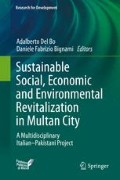Abstract
Poverty is widely considered as the major problem in the socioeconomic development of Pakistan. The main objective is the alleviation of poverty through the start-up of a microcredit system in the Walled City of Multan for the promotion of income-generating activities and the rehabilitation and strengthening of local arts and crafts. A theoretical and practical research methodology is applied to investigate the most suitable microcredit model for the local context. The study briefly analyzes economics of microcredit affecting the efficiency of the market as well as its improvement mechanisms and their applications. Subsequently the conventional microcredit lending methodologies (interest based) and their potentials in Multan were examined. Authors have conducted two levels of analysis to explore the strategic environment and the peculiar aspects of local context. The former is a field research to observe the unsatisfied local needs and the cultural and religious norms influencing the success of the initiative, and the latter is a desk analysis to assess the macroeconomic factors affecting program achievement and its sustainability. The study deepens the Islamic financial principles and related lending methodologies for tailoring the proposal on the cultural, social, and economic characteristics of the potential demand. The study suggests two different models to guarantee not limited access to loans. The first model is the “Poverty Reduction Project” aiming at poverty eradication and social inclusion promotion. This model is oriented at satisfying the needs of the lower market segment including “ultra poor,” poor, and vulnerable people (almost 55 % of Pakistani population) through the adoption of Akhuwat’s model. The “Poverty Reduction Project” has the double aim of preventing vulnerable people to fall into poverty and helping poor people to rise from poverty by providing interest-free loans for the promotion and support of income-generating activities. Proposal products are of two sorts: infrastructure loans and business loans. The second model is the “Handicraft Model,” developed by an interdisciplinary team of work, that has the purpose of financial inclusion of craftsmen. It is oriented at the higher market segment composed by “quasi nonpoor” and provides loans through the adoption of Murabaha model. The clients served by the Handicraft Model are small entrepreneurs. Main objective is supporting, aggregating, and promoting best practices of handicraft production for exporting opportunity. In this case the full cost of loan provision is charged to the borrower. Akhuwat is chosen as local partner for its social innovative business model, based on the vision of interest-free loans to economically poor. Both models are based on individual lending methodologies. By means of family loans, Akhuwat demonstrates that it is possible to reach very poor people through individual loans. Furthermore, individual lending seems to better fit the needs of people working in a productive urban context as the Walled City and allows to reduce inefficiencies nested in group loans historically applied in Pakistan.
Access this chapter
Tax calculation will be finalised at checkout
Purchases are for personal use only
References
Ahmad S (2008) Microfinance in Pakistan: policies and practice. Master Thesis, University of Twente
Akhuwat (2008) Akhuwat: microfinance with a difference, 3rd edn. Mahmood Kamboh, Lahore
Ali A, Alam A (2010) Role and performance of microcredit in Pakistan. Master Thesis, University West, Department of Economics and Informatics
Allen & Overy (2009) Islamic Microfinance Report for the International Development Law Organisation, London, http://upnews.kbu.ac.th/uploads/files/2012/04/02/7E.PDF
Armendáriz B, Morduch J (2005) The economics of microfinance. MIT Press, Cambridge, MA
Asim S (2008) Evaluating the impact of microcredit on women’s empowerment in Pakistan. Department of Economics, Oxford University, Oxford
CGAP (2006) Microfinance, prepared for CGAP UNCDF donor training, “The New Vision of Microfinance: Financial Services for the Poor”. http://www.globalenvision.org/library/4/1051
Davis J, White G, Damodaron S, Thorsten G (2008) Improving access to water supply and sanitation in urban India: microfinance for water and sanitation infrastructure development. Water Sci Technol 58:887–891
Hussan-Bano B (2009) Unraveling the delinquency problem (2008/2009) in Punjab Pakistan. Pakistan, Pakistan Microfinance Network
Karim N, Tarazi M, Reille X (2008) Islamic microfinance: an emerging market niche, GAP No. 49
Khan A (2008) Islamic microfinance theory, policy and practice. Islamic Relief, Birmingham, UK
Khan T, Khan REA (2009) Urban informal sector: How much women are struggling for family survival. Pakistan Dev Rev 48(1):67–95
Microenterprise training guide for Peace Corps volunteers (2003)
Muhammad S (2010) Microfinance challenges and opportunities in Pakistan. European J Soc Sci 14(1):88
Munir K (2012) Akhuwat: making microfinance work. Stanford Social Innovation Review
Mustafa Z, Ismailov N (2008) Entrepreneurship and Microfinance-A tool for empowerment of poor-Case of Akhuwat, Pakistan. Mälardalen University, Sweden
Pakistan Economic Survey (2010–2011) Economic Adviser’s Wing, Finance Division, Government of Pakistan, Islamabad
Pakistan Economic Survey (2011–2012) Economic Adviser’s Wing, Finance Division, Government of Pakistan, Islamabad
Pakistan Microfinance Network (2006) Pakistan Microfinance Review, Shades of Growth
Pakistan Microfinance Network (2007) Microwatch Issues 4
Pakistan Microfinance Network (2011) Microwatch Issues 19
Pakistan Microfinance Network (2012) Microwatch Issues 25
Pakistan Poverty alleviation Fund (2010) Annual Report
Pelgreffi P (2009) Il microcredito: una risposta ai problemi delle famiglie e delle microimprese, per emancipare dal bisogno, promuovere autonomia, generare responsabilità sociale
Ruiz L (2007) Microcredito: una discussione degli aspetti economici. Dipartimento di Scienze Economiche, Universita’ di Pisa, collana ricerche n. 112
Segrado (2005) Case study: Islamic microfinance and socially responsible investment, Media Project
Siddiqi K (2008) Potential of Islamic microfinance in Pakistan. Master Thesis
State Bank of Pakistan Annual Report (2006–2007), vol I
Author information
Authors and Affiliations
Corresponding author
Editor information
Editors and Affiliations
Rights and permissions
Copyright information
© 2014 Springer International Publishing Switzerland
About this chapter
Cite this chapter
Di Benedetto, C., Bengo, I. (2014). Microcredit System for Building Rehabilitation and Strengthening Arts and Crafts. In: Del Bo, A., Bignami, D. (eds) Sustainable Social, Economic and Environmental Revitalization in Multan City. Research for Development. Springer, Cham. https://doi.org/10.1007/978-3-319-02117-1_5
Download citation
DOI: https://doi.org/10.1007/978-3-319-02117-1_5
Published:
Publisher Name: Springer, Cham
Print ISBN: 978-3-319-02116-4
Online ISBN: 978-3-319-02117-1
eBook Packages: Business and EconomicsEconomics and Finance (R0)

